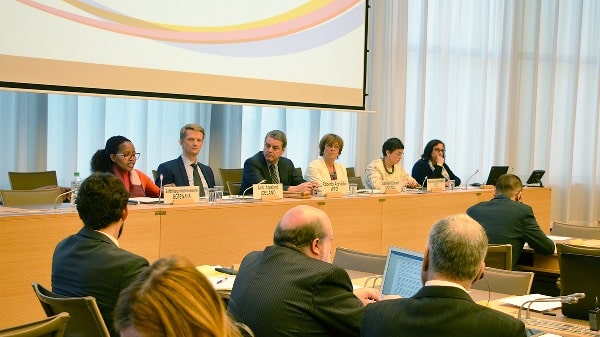El Director General Roberto Azevêdo destaca la función de los acuerdos comerciales para un mayor empoderamiento de las mujeres
El comercio y los acuerdos comerciales pueden ser un mecanismo útil para apoyar el empoderamiento económico de las mujeres y favorecer así el crecimiento económico y la reducción de la pobreza en todo el mundo, dijo el Director General Roberto Azevêdo en el Taller sobre “Consideraciones de Género en los Acuerdos Comerciales”

«There is a growing recognition that trade and trade rules can be a useful mechanism to support women’s economic empowerment. The 2017 Buenos Aires Declaration on Trade and Women’s Economic Empowerment should take credit for this shift in attitudes,» DG Azevêdo said. «122 members and observers have now signed that declaration. It has given the issue real momentum at the WTO. The Declaration identified various instruments that can help us better understand the links between trade and women’s economic empowerment. And members have been following through.»
DG Azevêdo spoke at the opening session of the workshop co-organized by Iceland, Botswana and the United Nations Conference on Trade and Development (UNCTAD) in cooperation with the WTO and the International Trade Centre (ITC). «I hope that today’s discussions can increase understanding and help to trigger new ideas on how women could benefit more from trade across the board. One thing is clear. All the evidence shows that giving women the same opportunities as men improves competitiveness and productivity. In turn, this boosts economic growth and poverty reduction,» he added. His full speech is available here.
«We are in a learning curve,» noted Harald Aspelund, Ambassador and Permanent Representative of Iceland to the WTO. «Until quite recently, the word gender was not very often pronounced close to the word trade. Fortunately, this is changing rapidly, and gender concerns are becoming more of a central issue in our trade agendas. We have come to realize that no topic is gender neutral and that trade can play an important role to increase women’s empowerment.»
Isabelle Durant, Deputy Secretary-General of UNCTAD, stressed the importance of data in examining women’s participation in international trade from various angles and noted that not all gender issues can be looked at through a trade perspective. «Although trade policies should be used to help empower women, this is not a panacea because policy makers cannot address all gender issues through trade. This brings us back to the importance of national policies that must be undertaken with regards to education, women and girls’ access to education, digitization, information, economic opportunities and so forth,» she said.
Arancha González, Executive Director of ITC, highlighted the specific gender dimension of small and medium enterprise (SME) participation in international trade. «There are specific barriers that affect women – regulatory barriers in the form of laws and regulations that are discriminatory; there are cultural biases; there is different access to resources, to assets, to finance; there is different access to information and intelligence; and there are differences in time constraints. As a result, businesses run by women are smaller in size than the average business run by men, making women’s businesses more sensitive to fixed trade costs,» she stressed.
Sefatlhego Matebekwane, Agricultural Attachée of Botswana, said: «We need events such as this seminar today to deepen our understanding, share experiences and lessons learned in terms of women’s empowerment. We know that there is not a one-size-fits-all solution. Therefore, we have to come up with policies that affect different societies differently. The seminar today allows us to analyze the steps taken so far and to ensure that we have enough knowledge and data to design inclusive trade policies that leave no one behind.»
During the event, speakers explored the role of free trade agreements (FTAs) in promoting gender equality and what has been achieved so far in terms of regional integration agreements and preferential trade schemes. They also discussed new ideas on ways the inclusion of gender issues in trade agreements may result in greater impact for women in practical terms.















